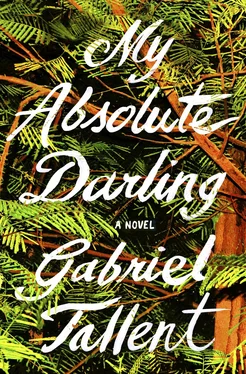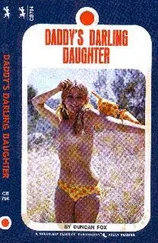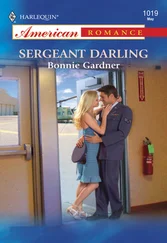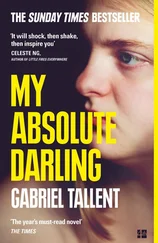He says, “Go get the whetstones, too, sweetpea.”
She goes to the kitchen and opens a drawer and pulls out the old leather bundle with the three whetstones and carries it back to the table.
He says, “You take good care of that.”
She sits looking at the blade, mute. She loves taking care of things.
Rosy, sitting on the floor between them, perks up, her collar tinkling. She looks toward the door, and then there is a loud knocking. Turtle flinches.
“That’ll be your father,” Grandpa says.
Martin swings the door open and steps inside. The floor complains beneath him. He stands spanning the hallway.
“Oh Christ, Dad,” Martin says, “I wish you wouldn’t drink in front of her.”
“She doesn’t mind me taking a drink,” Grandpa says. “Do you, sweetpea?”
“Christ, Daniel,” Martin says. “Of course she doesn’t mind. She’s fourteen. It’s not her job to mind, it’s mine; it’s my job to mind, and I do. It should be your job, too, but you don’t make it your job, I guess.”
“Well, I don’t see the harm.”
“I don’t mind it,” Martin says, “if you have a beer. I don’t mind that. I don’t mind it if you’re gonna pour yourself a finger or two of Jack. But I don’t like it when you’ve had more than a few. That’s not all right.”
“I’m fine,” Grandpa says with a wave of his hand.
“All right,” Martin says thinly, “all right. Come on back home, kibble.”
Turtle picks up the pistol, drops the slide, slaps in the magazine, holsters it. Then she rises, holding the knife and the bundle of whetstones, and walks toward the door, where Martin puts an arm around her shoulder. She slings the AR-10 and turns to look back at Grandpa. Martin hesitates there in the doorway, holding Turtle.
He says, “You all right, Dad?”
Grandpa says, “I’m fine.”
Martin says, “I don’t guess you’d want to come over for dinner?”
“Oh,” he says, “I have a pizza in the freezer.”
“You’re welcome to dinner. We’d like to have you over, Dad. Wouldn’t we, kibble?”
Turtle is silent, she does not want to be in this, does not want Grandpa to come over.
Martin says, “Well, have it your way. If you change your mind, you just call, and I’ll drive the truck up here and pick you up.”
“Oh, I’m all right,” Grandpa says.
“And, Dad,” Martin says, “take it easy. This girl deserves a grandfather. All right?”
“All right,” Grandpa says, frowning.
Martin continues to hesitate in the doorway. Grandpa watches him, his head trembling a little bit, and Martin stands as if expecting Grandpa to say something, but Grandpa doesn’t and Martin tightens his grip on Turtle’s shoulder and they walk down together, following the old gravel road through the orchard. He is a big, silent presence beside her. They go through the evening woods, past where Grandpa parks his truck. Blackberry runners have knit over the median. Wild chamomile sprawls in the gravel. “Don’t take this the wrong way, kibble,” Martin says, “but your grandpa is a real son of a bitch.”
Father and daughter climb the porch steps together and go in through the living room. Turtle vaults onto the counter and sets the knife down beside her. Martin strikes a match on his Levi’s to light the burner, takes down a frying pan, and begins to prepare dinner. Turtle sits at the counter’s edge. She unholsters the gun, racks the slide, and sinks four shots into a single mark. Martin looks up from cutting a squash and watches her empty the magazine. The slide locks back, smoking, and he returns his attention to the butcher block, smiling tiredly and lopsidedly, smiling so that she can see it.
“Is that your grandfather’s knife?” He dusts off his hands, holds one out.
Turtle hesitates.
“What?” he says, and she picks up the knife and hands it to him. He draws it from the sheath and walks around the counter to stand beside her, turning it to the light. He says, “When I was a kid, I can remember your grandfather sitting in his chair—he’d get in a mood and he’d drink bourbon and throw this knife at the door. Then he’d stand up and get it and sit down again, and he’d look at the door and then he’d throw the knife. It’d stick in the door and he’d walk over and get it. For hours, he’d do that.”
Turtle looks at Martin.
“Watch this,” he says.
“No,” she says, “wait.”
“It’s fine,” he says.
He walks to the hallway door beside the fireplace and closes it. He walks back and squares against the door. He says, “Watch this.”
She says, “It’s not a throwing knife.”
“The hell it isn’t,” he says.
She grabs on to his shirt. “Wait,” she says.
“Watch this,” he says, seeming to gauge the distance. He tosses the knife in the air and catches it by the spine. Turtle watches silently, putting her fingers in her mouth. Martin winds up and throws the knife and it ricochets off the door and strikes the hearthstones. Turtle lurches after it, but Martin is faster, shoving her aside and picking it off the river stone hearth and bending over it, putting his back between Turtle and the knife, saying, “Nah, it’s fine.”
“Give it back,” Turtle says.
Martin turns away from her, bent over the knife, saying, “It’s fine, kibble, it’s fine.”
“Give it back,” Turtle says.
“Just a moment,” he says. Turtle, hearing some dangerous note in his voice, steps back. “Just hold on just one goddamn moment,” he says, holding the knife to the light while Turtle waits, her jaw flexing in annoyance. “Well, fuck,” he says at last.
“What?”
“It’s this fucking carbon steel, kibble, it’s like glass.”
“Give it back to me,” she says, and he hands it back. The blade is chipped.
“It doesn’t matter,” Martin says.
“Fuck!” Turtle says.
“That high-carbon steel is worthless,” Martin says. “Like I told you, it’s like glass. That’s why they make knives out of stainless steel. That carbon steel, you just can’t trust it. Holds an edge like a motherfucker, but it shatters and it rusts. I don’t know how the man kept it like that, all through the war. Grease, I guess.”
“Fuck,” Turtle says, flushed with anger.
“Well, here, I’ll make it good.”
“Forget it,” Turtle says, “it doesn’t matter.”
“It does matter. You’re mad about it, my love. I’ll make it good.”
“No, I don’t care,” she says.
“Kibble,” he says, “give me the knife, I’m not going to have you pissed at me because that knife is as fragile as a fucking toy. I made a mistake, and I can set that knife up just like you want it, good as new.”
Turtle says, “It’s something you have to care for.”
“Well, that’s fucked, because,” Martin says, laughing at her anger, “I thought a knife was supposed to take care of you. I thought that was the point.”
Turtle stands, looking down at the floorboards, feeling that she has flushed red to the roots of her hair.
“Give me the knife, kibble. A pass on the sharpener and that mark won’t even be there.”
“No,” she says. “It doesn’t matter.”
“I can see on your face that it does matter, so give it to me, and let me make it right.”
Turtle gives him the knife and Martin opens the door and goes down the hall, past the bathroom, the foyer, and into the pantry, where there is a long wooden workbench along one wall, with clamps and vises and above that a wall of pegboard covered with mounted tools. The opposite walls are lined with gun safes, stainless-steel cabinets of reloading materials, stacked thousand-round boxes of 5.56 and .308. A spiral stairwell leads into a cellar, which is a room of damp, moldy earth filled with five-gallon buckets of dehydrated food. They have enough food stored down there to keep three people alive for three years.
Читать дальше
Конец ознакомительного отрывка
Купить книгу












